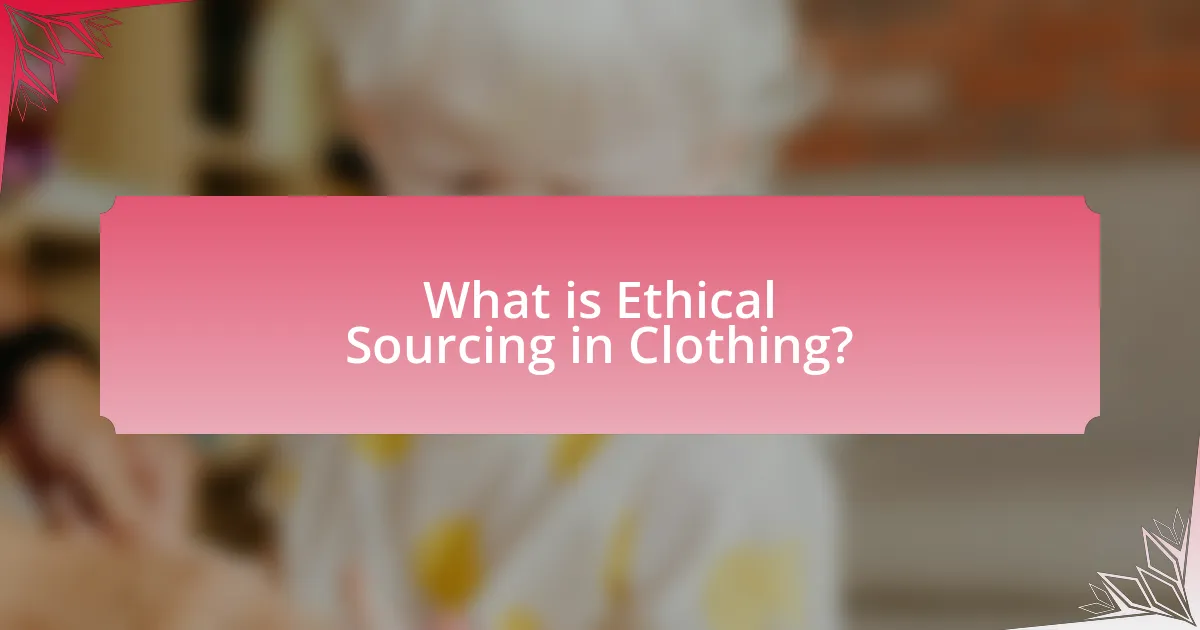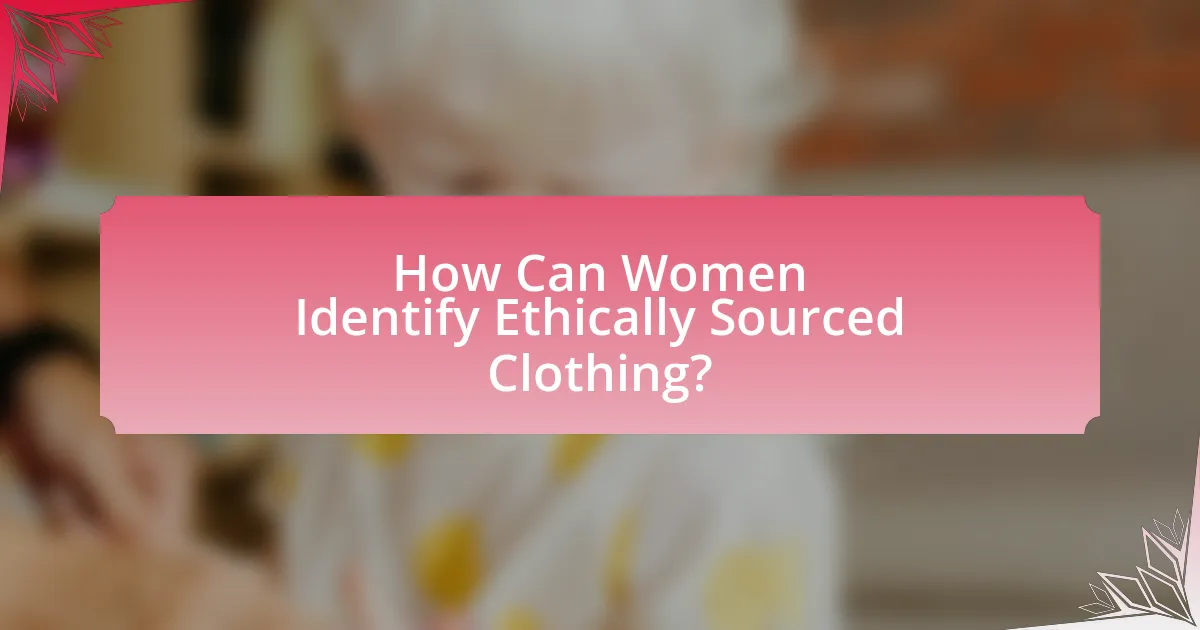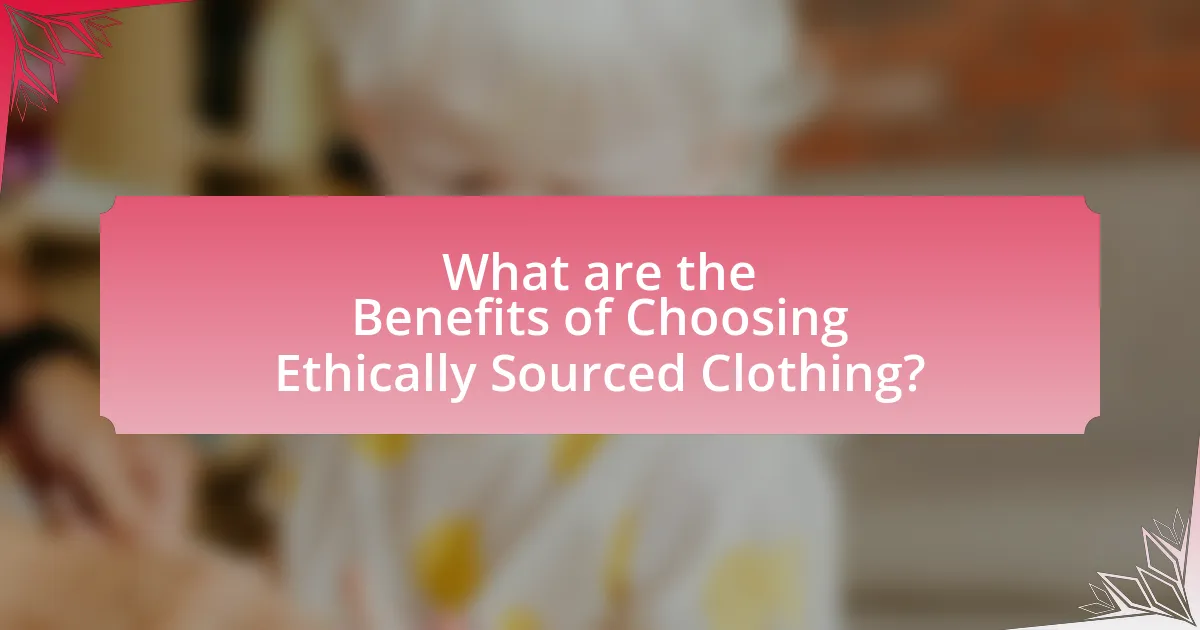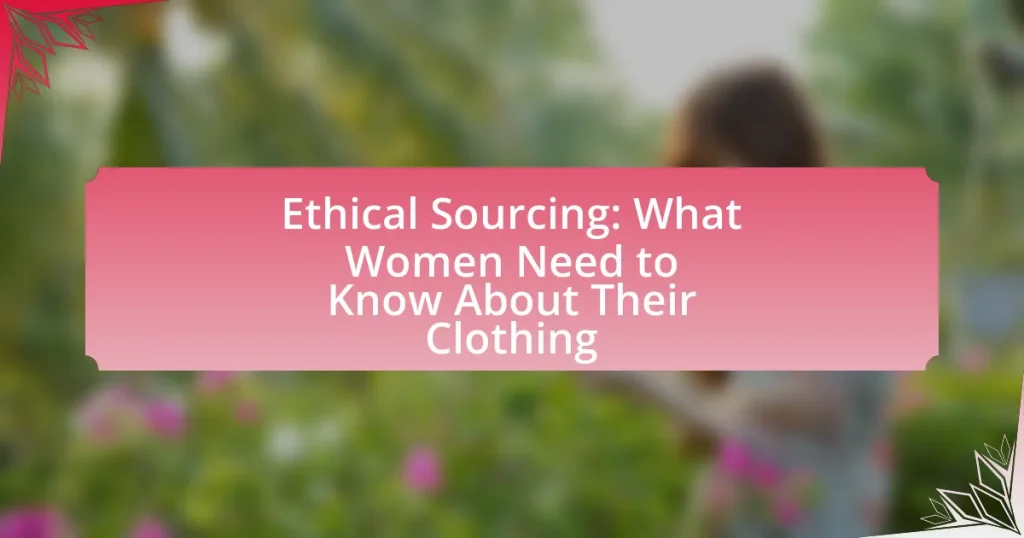Ethical sourcing in clothing is the practice of ensuring that garments are produced in a socially responsible and environmentally sustainable manner, focusing on fair labor practices and minimizing environmental impact. This article highlights the importance of ethical sourcing for women, who represent a significant portion of the garment workforce, and discusses key principles such as transparency, fair wages, and sustainable materials. It addresses common misconceptions about ethical sourcing, the challenges faced in implementing these practices, and the social and environmental benefits that arise from choosing ethically sourced clothing. Additionally, the article provides practical steps for women to identify and support ethical brands, empowering them to make informed purchasing decisions that align with their values.

What is Ethical Sourcing in Clothing?
Ethical sourcing in clothing refers to the practice of ensuring that garments are produced in a manner that is socially responsible and environmentally sustainable. This involves selecting materials and suppliers that adhere to fair labor practices, such as providing safe working conditions, fair wages, and respecting workers’ rights. According to the Ethical Trading Initiative, ethical sourcing also encompasses the environmental impact of production processes, promoting the use of sustainable materials and reducing waste.
Why is Ethical Sourcing Important for Women?
Ethical sourcing is important for women because it ensures fair labor practices and promotes gender equality in the supply chain. Women often make up a significant portion of the workforce in industries like textiles, where unethical practices can lead to exploitation, low wages, and unsafe working conditions. According to the International Labour Organization, women represent 80% of the garment workforce in many countries, making ethical sourcing crucial for improving their rights and livelihoods. By supporting brands that prioritize ethical sourcing, women can contribute to a more equitable economy and empower their peers in vulnerable positions.
What are the key principles of Ethical Sourcing?
The key principles of Ethical Sourcing include fair labor practices, environmental sustainability, and transparency in the supply chain. Fair labor practices ensure that workers receive fair wages, work in safe conditions, and are treated with respect, which is supported by the International Labour Organization’s standards. Environmental sustainability focuses on minimizing the ecological impact of production processes, promoting the use of sustainable materials, and reducing waste, as highlighted by various sustainability reports. Transparency in the supply chain involves clear communication about sourcing practices and the origins of materials, which builds consumer trust and accountability, as emphasized by organizations like the Ethical Trading Initiative.
How does Ethical Sourcing impact women’s clothing choices?
Ethical sourcing significantly influences women’s clothing choices by prioritizing sustainability and social responsibility in their purchasing decisions. Women increasingly seek brands that demonstrate ethical practices, such as fair labor conditions and environmentally friendly materials. A survey by McKinsey & Company found that 66% of consumers, particularly women, are willing to pay more for sustainable brands, indicating a strong preference for ethical sourcing. This shift not only affects individual purchasing behavior but also compels brands to adopt ethical practices to meet consumer demand, thereby reshaping the fashion industry landscape.
What are the common misconceptions about Ethical Sourcing?
Common misconceptions about ethical sourcing include the belief that it is synonymous with fair trade, that it guarantees high quality, and that it is only relevant for certain industries. Ethical sourcing is not limited to fair trade practices; it encompasses a broader range of ethical considerations, including labor rights, environmental impact, and supply chain transparency. Additionally, while ethical sourcing often promotes better quality products, it does not inherently guarantee superior quality, as various factors influence product standards. Lastly, ethical sourcing is applicable across all sectors, not just those traditionally associated with ethical practices, such as food or crafts, but also in fashion and textiles, where labor conditions and environmental sustainability are critical issues.
How do these misconceptions affect consumer behavior?
Misconceptions about ethical sourcing significantly distort consumer behavior by leading individuals to make uninformed purchasing decisions. For instance, when consumers believe that all brands claiming to be ethical are genuinely sustainable, they may overlook critical factors such as supply chain transparency and labor practices. This can result in increased support for companies that do not adhere to ethical standards, ultimately perpetuating unethical practices in the fashion industry. Research indicates that 66% of consumers are willing to pay more for sustainable brands, yet many remain unaware of the true implications of their choices, highlighting the gap between perception and reality in ethical sourcing.
What are the real challenges in Ethical Sourcing?
The real challenges in ethical sourcing include ensuring transparency in supply chains, verifying labor practices, and maintaining sustainable sourcing of materials. Transparency is often hindered by complex supply chains that obscure the origins of products, making it difficult for companies to trace and verify ethical practices. Labor practices pose a challenge as many suppliers may not adhere to fair labor standards, leading to exploitation and unsafe working conditions. Additionally, sourcing sustainable materials can be difficult due to limited availability and higher costs, which can deter companies from committing to ethical sourcing practices. These challenges are supported by reports indicating that over 70% of consumers express concern about unethical labor practices in the fashion industry, highlighting the need for improved ethical sourcing strategies.

How Can Women Identify Ethically Sourced Clothing?
Women can identify ethically sourced clothing by looking for certifications such as Fair Trade, GOTS (Global Organic Textile Standard), and OEKO-TEX, which indicate adherence to ethical labor practices and sustainable materials. These certifications ensure that the clothing is produced under fair working conditions, with respect for the environment. Additionally, women should research brands that provide transparency about their supply chains, including information on sourcing, labor practices, and environmental impact. Brands that openly share their production processes and engage in sustainable practices, such as using organic or recycled materials, further demonstrate their commitment to ethical sourcing.
What labels and certifications should women look for?
Women should look for labels and certifications that indicate ethical sourcing and sustainable practices in clothing. Key certifications include Fair Trade, which ensures fair wages and safe working conditions for workers; Global Organic Textile Standard (GOTS), which certifies organic fibers and environmentally friendly production processes; and OEKO-TEX Standard 100, which guarantees that textiles are free from harmful substances. These certifications provide assurance that the clothing is produced responsibly, aligning with ethical sourcing principles.
What do different certifications signify about clothing production?
Different certifications in clothing production signify adherence to specific ethical, environmental, and quality standards. For example, certifications like GOTS (Global Organic Textile Standard) indicate that the textiles are made from organic fibers and meet strict environmental criteria throughout the production process. Similarly, Fair Trade certification ensures that producers receive fair wages and work in safe conditions, promoting social equity. Certifications such as OEKO-TEX® Standard 100 guarantee that textiles are free from harmful substances, ensuring consumer safety. These certifications collectively provide consumers with assurance regarding the sustainability and ethical practices involved in the clothing they purchase.
How can women verify the authenticity of these labels?
Women can verify the authenticity of clothing labels by researching the brand’s certifications and supply chain practices. This involves checking for recognized certifications such as Fair Trade, GOTS (Global Organic Textile Standard), or OEKO-TEX, which indicate adherence to ethical and sustainable practices. Additionally, women can visit the brand’s official website to find transparency reports detailing sourcing and labor conditions. Engaging with customer reviews and third-party assessments can also provide insights into the brand’s authenticity. According to a 2021 report by the Ethical Fashion Forum, brands that are transparent about their supply chains are more likely to be authentic in their ethical claims.
What questions should women ask brands about their sourcing practices?
Women should ask brands the following questions about their sourcing practices: “Where are your materials sourced from?” This question helps identify the geographical origin of the materials, which can indicate labor practices and environmental impact. Additionally, women should inquire, “What are your labor practices and standards?” This question addresses the treatment of workers involved in the production process. Another important question is, “Do you have certifications for ethical sourcing?” Certifications can provide assurance that the brand adheres to specific ethical standards. Lastly, women should ask, “How do you ensure transparency in your supply chain?” This question seeks to understand the brand’s commitment to openness regarding their sourcing practices. These inquiries are essential for evaluating a brand’s ethical sourcing commitment.
How can transparency in sourcing influence purchasing decisions?
Transparency in sourcing significantly influences purchasing decisions by fostering consumer trust and loyalty. When brands openly share information about their supply chains, including labor practices and material origins, consumers are more likely to feel confident in their purchases. A study by Nielsen found that 66% of global consumers are willing to pay more for sustainable brands, indicating that transparency can directly impact buying behavior. Furthermore, consumers increasingly prefer brands that align with their values, and transparency serves as a critical factor in demonstrating ethical practices. This alignment can lead to increased sales and customer retention, as consumers are more inclined to support companies that prioritize ethical sourcing.
What role do brand values play in Ethical Sourcing?
Brand values are fundamental in ethical sourcing as they guide a company’s commitment to responsible practices. These values influence sourcing decisions, ensuring that materials are obtained from suppliers who adhere to ethical labor practices, environmental sustainability, and fair trade principles. For example, brands that prioritize transparency often disclose their supply chain practices, which can lead to increased consumer trust and loyalty. Research indicates that 66% of consumers are willing to pay more for sustainable brands, highlighting the impact of brand values on purchasing behavior and ethical sourcing initiatives.

What are the Benefits of Choosing Ethically Sourced Clothing?
Choosing ethically sourced clothing promotes sustainability, supports fair labor practices, and enhances consumer awareness. Ethically sourced clothing is produced with consideration for environmental impact, reducing waste and pollution associated with fast fashion. Additionally, it ensures that workers receive fair wages and safe working conditions, as evidenced by organizations like Fair Trade, which certifies brands that adhere to these principles. Furthermore, purchasing ethically sourced clothing fosters a sense of responsibility among consumers, encouraging them to make informed choices that align with their values.
How does Ethical Sourcing contribute to sustainability?
Ethical sourcing contributes to sustainability by ensuring that products are obtained in a responsible and environmentally friendly manner. This approach minimizes negative impacts on the environment, promotes fair labor practices, and supports local communities. For instance, according to the Ethical Trading Initiative, companies that adopt ethical sourcing practices often reduce their carbon footprint by sourcing materials locally and using sustainable production methods. This not only conserves resources but also fosters economic stability in the regions where these materials are sourced, thereby enhancing overall sustainability.
What environmental impacts are reduced through Ethical Sourcing?
Ethical sourcing reduces several environmental impacts, including deforestation, water pollution, and carbon emissions. By prioritizing sustainable materials and responsible farming practices, ethical sourcing minimizes the destruction of ecosystems and promotes biodiversity. For instance, organic cotton farming, a common practice in ethical sourcing, uses 91% less water than conventional cotton farming, significantly reducing water scarcity issues. Additionally, ethical sourcing often involves the use of recycled materials, which lowers waste and decreases the carbon footprint associated with production. This approach not only conserves natural resources but also mitigates the adverse effects of industrial pollution on local communities and ecosystems.
How does Ethical Sourcing support fair labor practices?
Ethical sourcing supports fair labor practices by ensuring that products are obtained from suppliers who adhere to labor rights standards. This approach promotes safe working conditions, fair wages, and the prohibition of child labor, which are essential components of fair labor practices. For instance, companies that engage in ethical sourcing often conduct audits and require certifications from suppliers, such as Fair Trade or WRAP (Worldwide Responsible Accredited Production), which verify compliance with labor laws and ethical standards. These measures help create a transparent supply chain that prioritizes the welfare of workers, thereby fostering a more equitable labor environment.
What social benefits arise from Ethical Sourcing?
Ethical sourcing provides significant social benefits, including improved labor conditions and community development. By ensuring fair wages and safe working environments, ethical sourcing enhances the quality of life for workers in the supply chain. For instance, companies that adopt ethical sourcing practices often report higher employee satisfaction and retention rates, which can lead to increased productivity. Additionally, ethical sourcing can contribute to community development by investing in local education and health initiatives, fostering a more sustainable and equitable society. Research from the Ethical Trading Initiative indicates that ethical sourcing practices can lead to a 20% increase in worker productivity and a 30% reduction in employee turnover, demonstrating the tangible social benefits of these practices.
How does Ethical Sourcing empower women in the fashion industry?
Ethical sourcing empowers women in the fashion industry by providing fair wages, safe working conditions, and opportunities for leadership roles. This approach ensures that women, who make up a significant portion of the workforce in garment production, receive equitable compensation and are not subjected to exploitative practices. For instance, brands that adopt ethical sourcing practices often collaborate with organizations that promote women’s rights, leading to increased access to education and skill development. According to a report by the World Bank, investing in women’s economic empowerment can boost productivity and economic growth, highlighting the positive impact of ethical sourcing on women’s livelihoods in the fashion sector.
What community impacts can result from Ethical Sourcing practices?
Ethical sourcing practices can lead to positive community impacts such as improved labor conditions, economic empowerment, and enhanced social equity. By ensuring fair wages and safe working environments, ethical sourcing directly contributes to the well-being of workers and their families. For instance, a study by the Ethical Trading Initiative found that companies implementing ethical sourcing policies saw a 20% increase in worker satisfaction and a significant reduction in workplace accidents. Additionally, ethical sourcing can stimulate local economies by supporting small-scale producers and fostering sustainable business practices, which in turn can lead to community development and reduced poverty levels.
What practical steps can women take to support Ethical Sourcing?
Women can support ethical sourcing by choosing to purchase clothing from brands that prioritize fair labor practices and sustainable materials. This includes researching companies to ensure they have transparent supply chains and certifications such as Fair Trade or GOTS (Global Organic Textile Standard). Additionally, women can advocate for ethical sourcing by participating in campaigns that promote awareness of labor rights and environmental sustainability in the fashion industry. Supporting local artisans and second-hand shops also contributes to ethical sourcing by reducing waste and promoting fair wages. According to a 2021 report by the Ethical Fashion Initiative, consumer demand for ethically sourced products has increased by 30%, highlighting the impact of informed purchasing decisions.
How can women build a sustainable wardrobe with ethical choices?
Women can build a sustainable wardrobe with ethical choices by prioritizing brands that practice transparency in their supply chains and use eco-friendly materials. Research indicates that the fashion industry is responsible for 10% of global carbon emissions, highlighting the importance of selecting clothing made from organic, recycled, or sustainably sourced fabrics. Additionally, women should consider purchasing second-hand clothing, which reduces waste and extends the lifecycle of garments. Supporting local artisans and brands that pay fair wages also contributes to ethical consumption. By making informed choices, women can significantly reduce their environmental impact while promoting social responsibility in fashion.
What are some tips for finding local ethical brands?
To find local ethical brands, start by researching community directories or websites that focus on sustainable and ethical businesses. Many cities have local initiatives or platforms that list ethical brands, such as the Ethical Consumer or local chambers of commerce. Additionally, visiting farmers’ markets or craft fairs can connect you with local artisans who prioritize ethical practices. Social media platforms, particularly Instagram, can also be useful; search for hashtags related to ethical fashion and local brands to discover new options. Furthermore, reading reviews and certifications from organizations like Fair Trade or B Corp can help verify a brand’s commitment to ethical practices.














